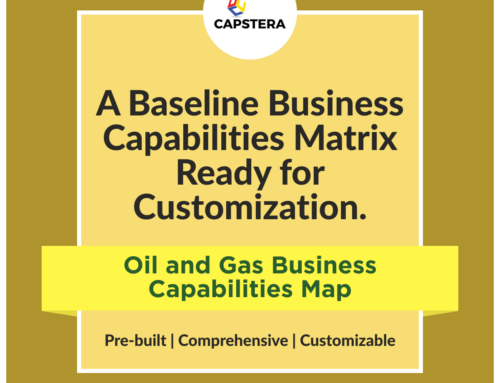
Leveraging business capabilities for strategy definition and execution offer enterprises a stable foundation to plan their transformation.
Every year, corporations worldwide undertake an essential rite of passage: annual strategic planning. These sessions often guide organizations toward their anticipated goals, outlining their future trajectory and defining their corporate ambitions. But unfortunately, many companies stumble when translating strategic vision into operational reality. The problem often lies in the strategic plan’s level of abstraction, which creates a gap between what the company wants to achieve and the actual work that needs to be done. This is where business capabilities come into play.
The Essence of Business Capabilities
Business capabilities can be defined as the fundamental entities that enable an enterprise to function and create value. They encompass an organization’s abilities to execute its strategy, spanning resources, skills, competencies, technology, and processes. Business capabilities provide how an organization serves its customers, competes in its markets, and ultimately fulfills its purpose.
Essentially, business capabilities are what an organization can do, not how it does it. They offer a way to look at a company’s strengths and weaknesses and provide a clear link between strategy and execution.
Strategy Definition through the Lens of Business Capabilities
When defining the strategy, business capabilities offer an invaluable resource. They provide a holistic perspective on what the company can achieve and how it can differentiate itself in the marketplace. Businesses can carve out distinctive niches, optimize resources, and forge competitive advantages by focusing on their unique capabilities.
Businesses should undertake a capabilities audit to leverage business capabilities in strategy definition.’ This involves evaluating their current capabilities, identifying gaps, and recognizing areas for improvement. They can then align their strategic objectives with their existing and potential capabilities, ensuring their plans are grounded in reality.
Moreover, business capabilities help in maintaining a customer-centric approach in strategic planning. They link the organization’s internal processes with external customer needs, ensuring value delivery. In this way, business capabilities keep the strategy focused on what truly matters: creating customer value.
Business Capabilities for Strategy Definition and Execution
Beyond defining strategy, business capabilities also provide the means to execution. They serve as the bridge that spans the chasm between strategic vision and operational realization.
Business capabilities facilitate translating strategy into operational terms by breaking down high-level goals into concrete actions. They provide a clear picture of what needs to be done to achieve strategic objectives and how each functional area contributes to the overall strategy. This ‘decomposition’ of the strategy into business capabilities helps create a coherent, unified plan across different business units.
Moreover, business capabilities offer a roadmap for execution. They highlight the areas that need investment, the skills that need development, the processes that need refinement, and the technologies that need adoption. Essentially, they outline the ‘how’ of the strategy, providing a path that guides the organization from where it is to where it wants to be.
Furthermore, business capabilities offer a mechanism for monitoring and tracking progress toward strategic objectives. They enable organizations to measure their performance against their strategic goals, using metrics that reflect their capabilities. By doing so, they provide valuable feedback that can be used to adjust the strategy and steer the organization in the right direction.
In the grand scheme of corporate strategy, business capabilities play an instrumental role. They are not just the nuts and bolts that keep the corporate machine running; they are the organization’s DNA, embodying its potential and driving its success.
By leveraging business capabilities for strategy definition and execution, companies can ensure their strategic plans are not just high-level visions but practical roadmaps to success. As a result, they can bridge the gap between strategy and execution, translating their corporate ambitions into operational realities.
In the end, the power of business capabilities lies in their simplicity. They offer a clear, understandable, and actionable way to view the organization, align strategy, and guide execution. As a result, they are a vital tool for any organization aiming to transform its strategic vision into a tangible reality.
Is your company using business capabilities for strategy definition and execution?



